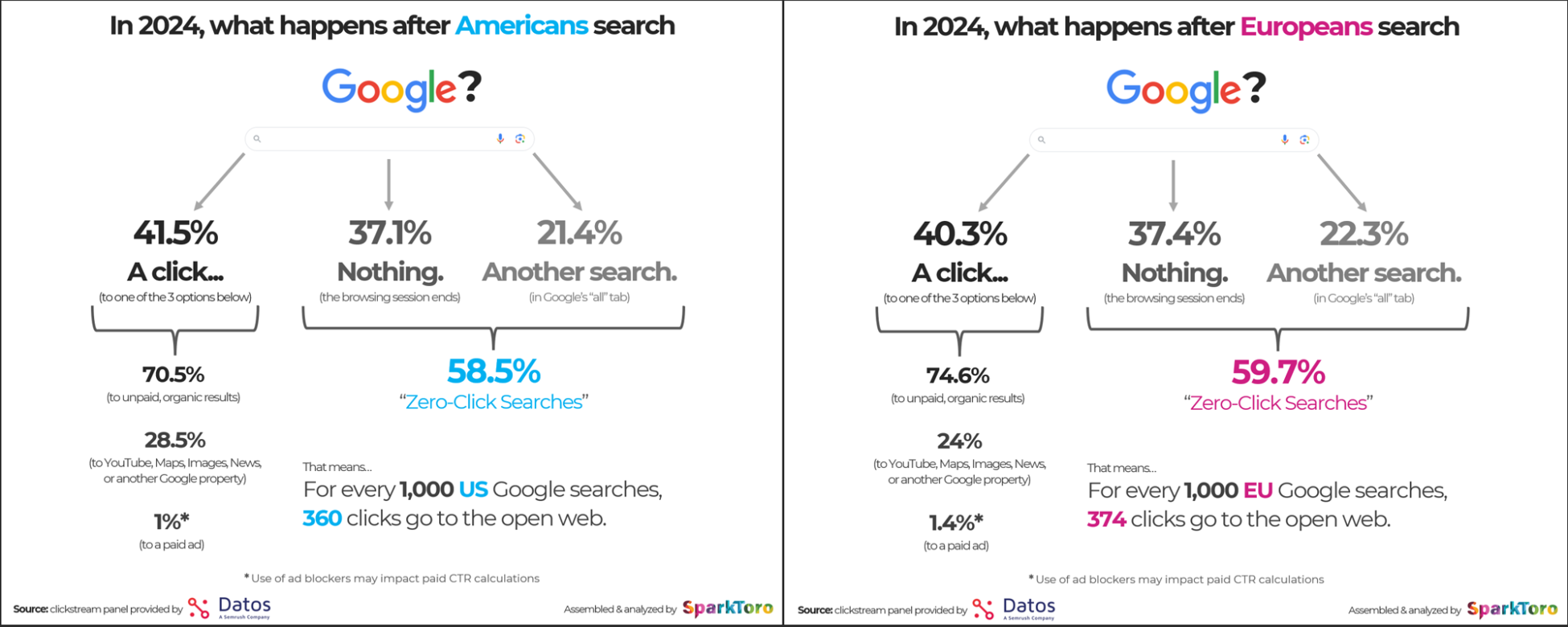Search engine optimization isn’t dying—it’s just shifting gears.
Have you noticed your organic traffic dipping lately? You’re not alone. It’s not a sign your SEO strategy is broken—it’s the search landscape evolving. AI-powered summaries, featured answers, and zero-click results are now stealing the spotlight. People are still seeing your content, but they don’t always need to click through to get what they need. So, the old playbook? It requires an update.
Here are the SEO trends that actually matter in 2025—backed by industry shifts and what we’ve learned firsthand optimizing content for generative search.

1. SEO Metrics Are Evolving & That’s a Good Thing
The most significant SEO shift of 2025 isn’t a Google algorithm tweak. It’s how we define success.
Traditional KPIs like organic sessions and CTR aren’t the end-all anymore. Why? Because AI Overviews and smart snippets often answer user queries before they even reach your site.
But that doesn’t mean your content isn’t working.
New metrics like impressions, referral traffic from AI engines, and Share of Voice (SOV) offer a clearer picture of your brand’s visibility. If your content is featured in AI summaries, ChatGPT outputs, or other discovery engines, that’s a significant win—even if you don’t see a click.
Want to go deeper? Check out our full guide on SEO KPIs to track in 2025.
2. AI Tools Are Everywhere—But Human Insight Still Wins
AI-generated content is fast, cheap, and everywhere. But it often lacks depth. Google’s Helpful Content System has made it clear: real experience still wins.
Use AI to brainstorm or build outlines—but don’t stop there.
Add what only you can: industry know-how, original data, and firsthand examples. In 2025, content that brings genuine insight will outperform generic AI copy.
Quick tip: Use tools like ChatGPT for SEO to draft a structure, then enrich it with subject-matter expertise and stories from your own work. That’s what stands out in both traditional and AI-driven search.

3. Zero-Click Searches Aren’t the End—They’re a New Beginning
According to SparkToro, nearly 60% of Google searches now end without a click. That trend isn’t going away.
But here’s the upside: if your brand is mentioned in an AI answer or featured snippet, you’re still winning visibility and brand awareness. Searchers remember brands that consistently show up with helpful info.
To earn that placement, format your content with clarity, answer questions directly, and use language that mirrors how people naturally ask things.

4. Search Is No Longer Just Google
Google isn’t the only game in town.
In 2025, users are searching on platforms like TikTok, YouTube, Reddit, Perplexity, and ChatGPT. If you’re only optimizing for Google, you’re leaving opportunities on the table.
Here’s how to adapt:
- Turn blog posts into short-form video for TikTok or YouTube Shorts
- Share thought leadership on Reddit threads or niche communities
- Track traffic from AI engines in GA4 using regex filters
It’s important to note that despite the rise of generative AI tools like ChatGPT, Google’s dominance in search remains strong—new research shows Google Search grew over 20% in 2024 and still handles 373 times more search queries than ChatGPT. https://sparktoro.com/blog/new-research-google-search-grew-20-in-2024-receives-373x-more-searches-than-chatgpt/
5. E-E-A-T: Experience Is the Game-Changer
Google’s E-E-A-T guidelines (Experience, Expertise, Authoritativeness, Trust) are getting more attention—and rightly so.
This isn’t about stuffing bios with credentials. It’s about showing firsthand knowledge. Whether it’s how-to content, industry commentary, or in-depth analysis, experience-driven content has a better shot at ranking.
Ask yourself:
- Does this reflect real-world use or advice?
- Would someone choose this over AI-generated fluff?
If the answer is yes, you’re on the right track.
6. Intent > Keywords
Ranking for a keyword doesn’t mean much if your content doesn’t match what the searcher actually wants.
For example, someone Googling “best project management tools“ might want a list, a comparison chart, or a recommendation by use case. Look at the top results and mirror their structure if it aligns with searcher expectations.
Search intent is what separates rank-chasing from real results.
7. Long-Tail Keywords Are Underrated (Still)
Broad terms are competitive and vague. Long-tail keywords? They get to the point.
A phrase like “best free CRM for nonprofits with under 10 employees“ may not bring in thousands of visits—but the people it does attract are way more likely to convert.
Long-tail keywords also improve your odds of being cited in AI summaries, which lean on context-rich answers to complex questions.
Adaptability Is the Real SEO Power Move
If one thing’s clear about SEO in 2025, it’s this: what worked yesterday might not work tomorrow.
The brands that stay visible? They’re the ones who:
- Embrace new platforms and engines
- Measure what actually matters
- Use AI smartly, without sounding like a robot
- Write with authority and empathy
AI is changing SEO faster than ever. Here’s what you need to know about how AI impact SEO.
Let’s Talk SEO Strategy for the AI Era
Wondering how to adapt your content for generative search or rethink your performance metrics? Reach out to Menerva Digital and let’s create an SEO strategy that keeps your brand visible—no matter where or how people are searching.





